This guest blog post is written by Nick Gill, a project manager at the Sortition Foundation. Sortition Foundation campaigns to transform politics by upgrading our democracy to a system that works for the people. You can find details of some of their current projects at the end of this post. Whilst focusing primarily on the UK, many of the issues this post highlights are replicated in other countries. Problems such as these are at the root of Extinction Rebellion’s (XR’s) call for democracies to be upgraded through the use of citizens’ assemblies.
XR’s third demand is for governments to create and be led by the decisions of citizens’ assemblies on climate and ecological justice. It is important to stress that this demand does not go as far as the replacement of elected politicians, which is something the Sortition Foundation advocates for in this post. However, XR’s rationale for wishing to involve ordinary citizens far more in the decision making process stems from a desire to address the same kinds of issues.
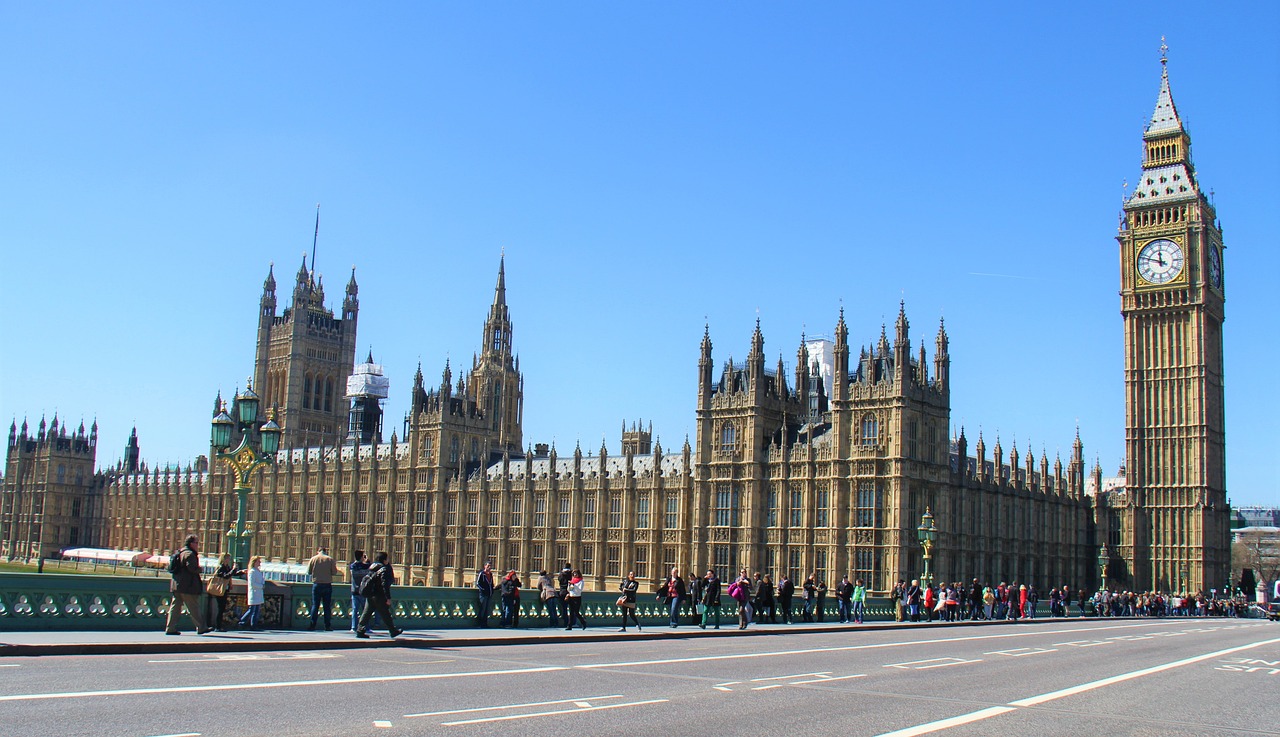
Image by Bidyut Das from Pixabay
"Democracy must be something more than two wolves and a sheep voting on what to have for dinner." - James Bovard
Chances are that you are reading this blog because you are scared, frustrated and angry about the climate crisis. Maybe you’ve just finished shouting at the radio after hearing another interview with a politician who should be taking responsibility for responding quickly and decisively but, instead, is mouthing platitudes and excuses.
It’s tempting to conclude that all politicians are *?£$%s… But is that just an easy answer? Is there something deeper going on? Is it even possible that, by blaming politicians for our collective failure on various fundamental issues, we’re missing the fact that our political system itself is to blame? Let’s unpick this a little.
Problem politicians… problem humans?
There’s no getting past the fact that politicians are, by and large, very particular beasts. Many of them hail from the same strata of society, many share an elite educational background, many are independently wealthy.
What makes this so damaging is that there is ample evidence that elected politicians vote largely according to their class interests, that the concerns of the bottom third of the socio-economic ladder are almost entirely ignored and that those of the middle third are only considered when they happen to be in alignment with the views of the upper third.
Perhaps we are right, then, to conclude that it is the politicians themselves that are the problem. If we had different politicians, maybe we’d get different decisions being made. Isn’t this the whole point of the electoral process?
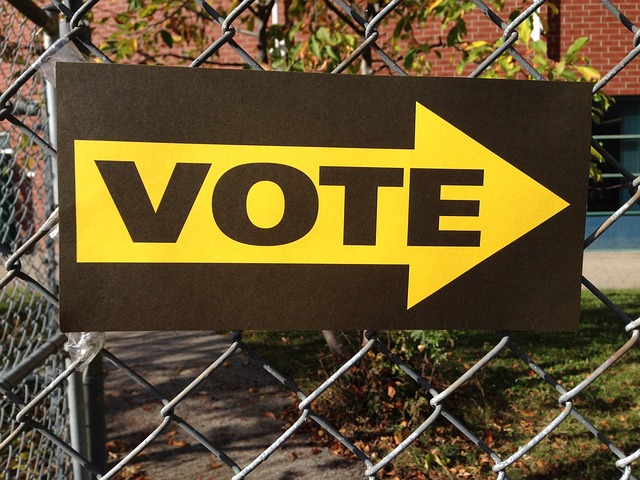
Image by Leslie Andrachuk from Pixabay
On the other hand, is it not true that we all have difficulty making decisions that threaten our own immediate self-interest? Speaking personally, this is a truth that I have arrived at after much sober self-reflection. And if this is a truth that we are willing to accept applies to (nearly?) all humans, then we must accept that it will be true of our politicians too, no matter which stratum of society they are drawn from.
What are the implications of this truth for the way we run our democracy? We consider four consequences.
Problem 1: short–termism
Climate change is a classic example of an issue that undoubtedly requires that we collectively agree to suffer some possibly intense short-term pain in order to ameliorate our long-term prospects.
But the people we are asking to make decisions on this matter are, in many cases, career politicians, whose professional survival is re-evaluated every 5 years at the polling booth. We need them to make decisions that potentially look very bad for ordinary people over that time span… but which will, we hope, be vindicated by the consequences that follow 10, 20 or 50 years into the future.
Selling such a prospect is a hard ask, especially to an electorate who are naturally suspicious when the political class tells them they need to suffer (more austerity anyone?). A far easier option and an option that aligns much better with the politician’s own self-interest (and their party’s collective self-interest) is to stick to decisions with a fast pay-off.
The irony is, of course, that it is the very mechanism we see as central to a functioning democracy – regular elections – that is actively preventing good decision making in this case.
Problem 2: vested interests
The electoral cycle presents further obstacles when one considers the resources required to win an election. Individual politicians and their parties must communicate their message in a media space that is immensely crowded.
Crowded… and not at all impartial. Any prospective prime minister knows that a sympathetic editorial line from any of the major newspapers will depend on policy aligning with the declared interests of that newspaper (and their owners). In 1992, The Sun newspaper declared that “It’s the Sun wot won it” when John Major was voted back into office, and politicians have been mindful of this ever since.
One can extend this analysis from traditional media to all of the modern machinery of the political lobby. For big oil and other major corporations, the electoral cycle offers a tremendous point of leverage: these corporations have the resources that will allow politicians to look after their own short-term interests and get back in power. A politician taking a more principled stance and turning their back on such resources is unfortunately likely to diminish their chances of electoral success.

Image by Alexsander-777 from Pixabay
Problem 3: lack of representation
We said at the start that, although it might be wrong to see politicians themselves as the root cause of our political problems, still the demographics of politicians (particularly around class, wealth and education) present a particular problem.
In a different world, where our politicians were drawn from all areas of society and were genuinely representative of the society they served, the problem of our struggle with self-interest would be nowhere near as damaging. If each politician had a different self-interest and these self-interests all pulled in different directions, then the many forces coming to play on any given decision would accurately reflect the concerns and priorities of wider society. One might reasonably hope for a resolution that reflected the wider, collective interest.
The problem as it stands, though, is that the self-interests of many politicians often align, even across party lines. First and foremost, our lawmakers are, by their very position, powerful and successful people. The status quo has worked for them, and worked spectacularly well. Threatening that status quo would be at odds with their own individual self-interest and with the corporate self-interest of the political class. We demand change from the very people that change threatens most.
Problem 4: adversarial discourse
The alignment of self-interest is amplified by the adversarial nature of the Westminster system. The “debates” that we see in the palace of Westminster are not conducted with a view to widening understanding and learning on the issue at hand, rather they are an exercise in political point scoring, in shoring up the political capital of whichever politician or party can shout the loudest.
In this context, it is rarely in the interest of any politician (or party) to allow their point of view to change or develop – witness the scorn poured on any decision maker who dares “make a u-turn”.
One can imagine a different type of discourse – let’s call it deliberative – wherein the emphasis is on a free exchange of ideas and experience and shared learning on the topic in question. The aim of such a discourse would be to allow all participants to move together, from disparate positions representing their own self-interest, to a shared understanding of what might work best for the whole population.
Is our politics broken, or our democracy?
How do we solve a problem like democracy? It is an article of faith in modern society that our political system is the “least bad” of all the alternatives. There may be some truth to that but it doesn’t preclude the possibility that our democracy might benefit from a reboot.
How do we stay true to democracy’s strapline of “government by the people, for the people” and yet also address some of the issues we have seen that arise from the interaction of the electoral cycle with our political class?
The answer, we at Sortition Foundation would contend, is to take the “by the people” part of democracy more seriously. Representative democracy was developed in this country, first of all, to allow men of wealth to choose some of their number to take decisions on behalf of the rest of the nation. Over ensuing centuries, the people have forced the establishment to extend the franchise to working-class men, to propertied women, to all men and women over the age of 21 and then, in 1969, to all men and women over the age of 18.
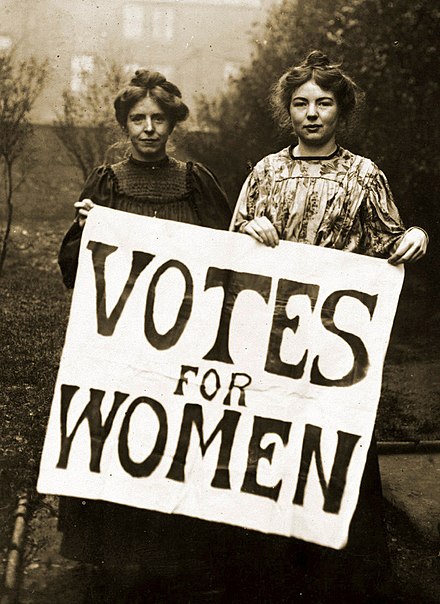
Image from http://www.hastingspress.co.uk/history/sufpix.htm, Public domain, via Wikimedia Commons
But despite these seismic changes, the “modern” system of democracy has always ensured that the people are kept at a healthy distance from the big decisions. Instead, we elect a representative every 5 years to speak on our behalf and make our decisions for us.
We wrote “modern” in inverted commas just now because this system seems, to us, strangely antiquated. We’ve described above some of the practical, negative consequences of our traditional, representative democracy. In contrast, we look around us and see, for instance, how traditional media has been subverted and taken into the hands of individuals to create the media they wish to consume and we find ourselves asking why we can’t do the same with our politics?
Upgrade democracy
The Sortition Foundation proposes that the UK adopts a system of democracy based on `democratic lottery’, that is, on the random selection of people from across our country who come together as law makers for a fixed period to make decisions on behalf of us all.
We contend that such a system would remove the priority of short-term decisions inflicted on us by the electoral cycle. Our representatives would serve a one-off fixed term for which there would be no re-election.
We contend that vested interests would lose much of their leverage. By removing elections, we remove the need for our representatives to court those with wealth and resources. Lobbies that have worked for years to ensure that the wheels of change are stuck fast in place would find themselves subject to the will of the people, rather than the other way round.
We contend that such a system would ensure that our representatives were drawn from all walks of life. There would be no Old Boys’ Club smoothing the ascent to power of the next generation of hand-picked smooth-talking career politicians. Instead, our decision makers would be the nurses, teachers, street cleaners, shop workers, retired people, school leavers etc. who make up the everyday people in this nation.
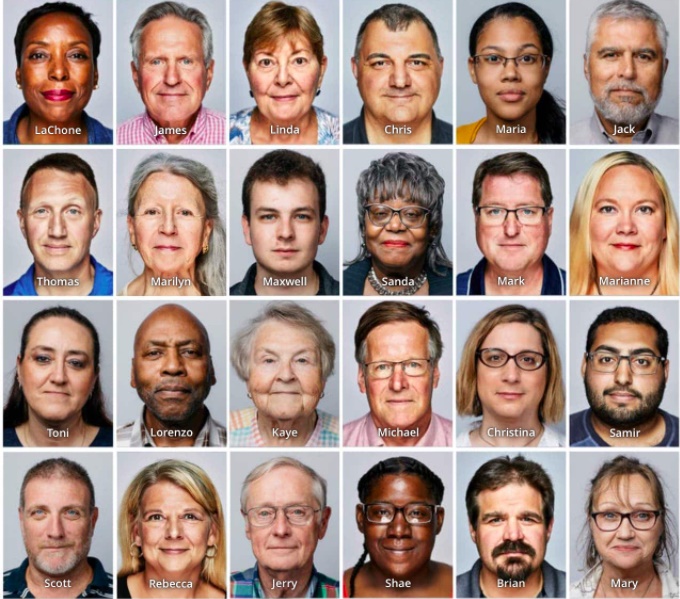
Image from Sortition Foundation
We contend that such a system would allow decisions to be made through a process of careful and thoughtful deliberation rather than through adversarial point–scoring. The wisdom and life-experience of ordinary people would inform decisions and allow nuanced debate and discussion to take place.
Such a process won’t be easy – ordinary people can disagree with each other as much as politicians can! Nonetheless, these disagreements will reflect the differing points of view of the wider population. And in this regard the decisions makers in such a system will undoubtedly have a lot in common: the people who make decisions about the National Health Service (NHS), for instance, will be people who know that they and their loved ones will need that publicly funded healthcare now and as they grow older because, unlike our current political class, they don’t have the money to buy themselves the care that they need when they need it.
Conclusion
Sortition Foundation exists to make the argument for a new, upgraded democracy. The ideas above are just a starting point – much greater detail can be found in a recent practical proposal for upgrading democracy in Scotland as well as in the resources listed below. We believe that the system we propose stands up to scrutiny and we invite you to join us in making the argument for a new democracy in the UK and around the world.
This is an argument that we must win if we are to collectively take the decisions we need to take: on climate, on health and social care, on immigration, on equality and fairness and more. Our first target is the House of Lords – only when that falls and a House of Citizens rises in its place, will we, the people, truly be able to start, together, to actively change our future.
We view the adoption of citizens' assemblies as advocated by XR as a positive step towards fixing our broken political system and improving decision making.
Let’s transform politics and upgrade our democracy.
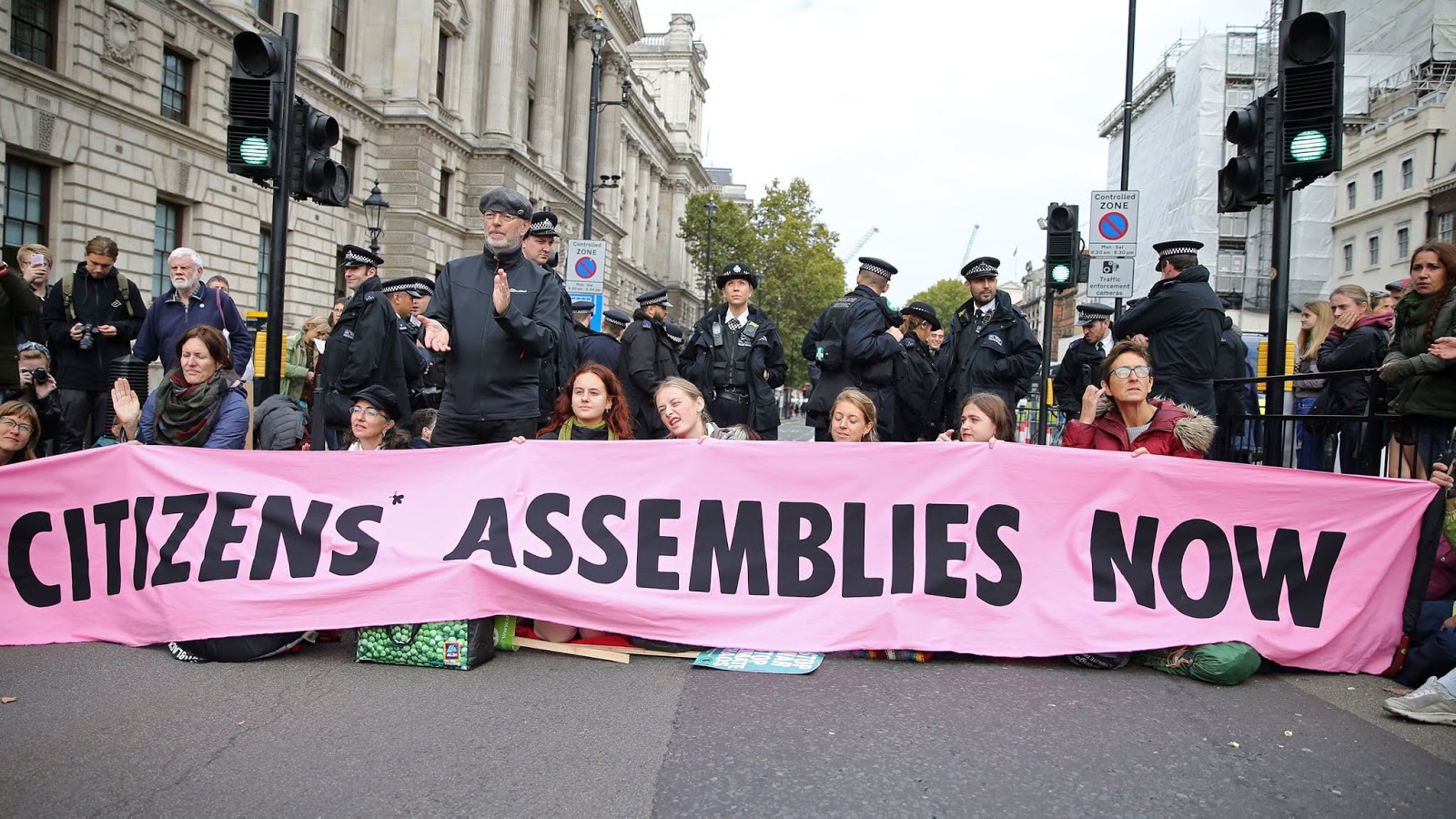
Image from FT
Learn more
Books:
- “The End of Politicians” by Brett Hennig (founder of Sortition Foundation)
- “Against Elections” by David Van Reybrouck
- “Reimagining democracy” by David Farrell and Jane Suiter (an important case study from Ireland)
Videos:
- “What if we replaced politicians with randomly selected people?” TED talk by Brett Hennig
- “On climate governance and climate assemblies” Interview with Professor Graham Smith
- “Goodbye Elections, Hello Democracy” Groundbreaking new film
Campaigns:
- “How to talk about political reform” Messaging guide from the Democracy Network
- Get rid of the House of Lords
- Sortition Foundation